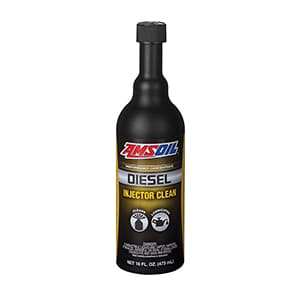The delivery systems for diesel fuel have advanced considerably over the years. Fuel economy in diesel engines has improved, power has increased, and emissions have decreased. Nevertheless, one sticky issue for diesel operators has been deposits that degrade engine performance. Thankfully, AMSOIL offers high-quality diesel fuel additives to address these persistent issues. In this blog post, we’ll go over how diesel fuel injection systems have evolved, and how injector deposits have evolved with them. We’ll also discuss how to clean diesel fuel injectors without removing them with AMSOIL diesel fuel additives.

What was the HEUI System?
Manufacturers of diesel motors started looking for methods to lower emissions and enhance fuel efficiency while simultaneously maintaining torque and power in the early 1990s. One of the proposed techniques involved completely redesigning the system for fuel delivery. HEUI, or hydraulically actuated electronic unit injection, was introduced in ‘93. This system utilized oil that was highly pressurized to pressurize fuel mechanically within the injector before it entered the combustion chamber. In contrast to the mechanical injectors of that time, the resulting 21,000-25,000 psi fuel injection pressures significantly lowered emissions and increased fuel economy, while simultaneously leaving performance unaffected.

What is the HPCR System?
HPCR, or high-pressure common rail direct-fuel injection is the most recent advancement in diesel fuel delivery. Throughout the past few decades, the HPCR System has gradually rendered the HEUI System outdated. Most diesel motor manufacturers today utilize the HPCR System. Common rail refers to the singular fuel rail that all injectors receive fuel from, in contrast to a system where there are separate lines for every injector. Fuel pressures within HPCR systems can reach 30,000 psi or more. This effectively transforms the fuel into a fine mist before combustion through the process of atomization. HPCR systems enable diesel motor manufacturers to make diesel motors that have more power while simultaneously satisfying stringent emissions regulations. Some modern common-rail motors are equipped with piezoelectric injectors that allow many injections in each cycle. Such motors experience performance improvements, better fuel economy, decreased emissions, and less motor noise.

Drawbacks to Direct Injections Systems
In diesel motors that use direct injection, the air and fuel are combined in the combustion chamber, where high-temp compressed air causes an ignition to occur. This setup improves the efficiency of combustion, but due to the high heat present in the combustion chamber there is also an increased risk of harmful deposits being left on the injectors. High temperatures and deposits go hand-in-hand, and they can lead to decreased fuel economy and horsepower loss.

New Tech To Combat Deposits
Nozzle coking, where deposits develop on the tips of injectors, had been an occurrence for quite some time in HEUI systems. These harmful deposits build up around the nozzle entrances through which fuel passes, ruining the spray pattern and decreasing efficiency. Within the newer HPCR systems, a different type of deposit problem has emerged. Internal diesel injector deposits form within the fuel injectors, as opposed to the external tip deposits. Injectors present in HPCR systems have very low tolerances of one to three microns, and as a result even the most seemingly insignificant deposits can cause major sticking problems. (For reference, a human hair is anywhere from seventy to one hundred microns in thickness.) This can lead to downtime, reduced motor performance, and unnecessarily high maintenance expenses.

The Solution to Injector Deposits
The majority of US OEMs have found internal diesel injector deposits during field trials or testing. Some OEMs have begun to offer their own diesel fuel additives. Unfortunately for diesel engine operators, most all-in-one diesel additives on the market today don’t effectively address the problem of modern internal diesel injector deposits, which are much more difficult to deal with than the external nozzle coking of the past and require much more advanced formulations to effectively remove. To address this gap in the market, AMSOIL developed Diesel Injector Clean and Diesel Cold Flow. These premium diesel additives feature advanced proprietary chemistry that effectively guards against internal diesel injector deposits. These high-performance diesel additive concentrates offer protection that conventional OEM all-in-one diesel additives can’t match and are the best way to clean diesel fuel injectors without removing them.
